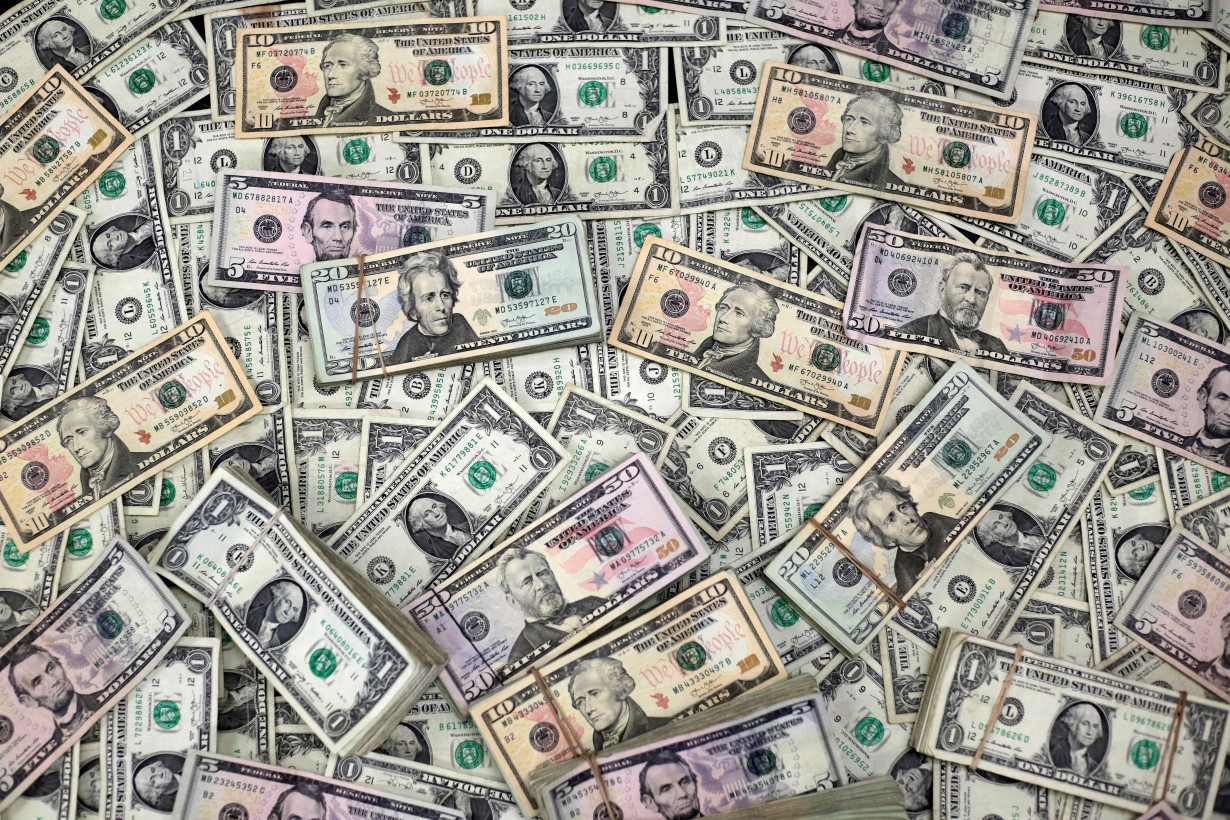By Harry Robertson and Chibuike Oguh
NEW YORK/LONDON (Reuters) -The Euro gained on Tuesday following reports that German political parties had agreed to form a coalition, while the U.S. dollar weakened against major currencies and China's offshore yuan hit a record low.
Germany's conservatives under chancellor-in-waiting Friedrich Merz on Tuesday reached a deal with the centre-left Social Democrats (SPD) to form a government, NTV reported. But two people with knowledge of the matter denied to Reuters that a deal has been reached.
Investors have been focused on the trade disputes sparked by President Donald Trump's sweeping tariffs that have roiled markets for three days.
The euro was last up 0.52% at $1.0958 after falling for the two previous days.
The Japanese yen and Swiss franc continued to benefit from appetite for safe havens, however, as investors remain concerned about the potential for a global recession.
Markets are bracing for a war of attrition between the U.S. and China. Beijing has refused to bow to what it called "blackmail" and vowed to "fight to the end" after Trump threatened to ratchet up tariffs to 104% in response to China's decision to match "reciprocal" duties Trump announced last week.
Trump said on Tuesday that he is waiting to hear from China before duties take effect. U.S. Trade Representative Jamieson Greer told U.S. senators on Tuesday that the Trump's administration will not back down from its trade strategy in the near term.
China's offshore yuan hit its lowest level since it started trading in 2010, at 7.3815 per dollar. It was last down 1.05% against the greenback to 7.423 per dollar.
The dollar weakened 1% to 146.30 yen against the Japanese yen and was down 1.48% to 0.84780 franc against the Swiss franc.
Marvin Loh, senior global market strategist at State Street in Boston, said the dollar's underperformance against its peers has been partly driven by recession worries in face of tariffs.
Currencies that often fare well when stock markets are rising also recovered, with the pound up 0.44%. The Australian dollar was down 0.36% after giving up gains early in the session. Both currencies dropped in the previous two sessions.
Investors on Tuesday gleaned some positive signs from the Trump administration about tariff talks. Treasury Secretary Scott Bessent said on Monday he hoped negotiations would bring levies down. Trump said Japan was sending a team to start negotiations, helping Japanese equities rally sharply overnight.
On Wall Street, all three main indexes finished lower on the session, clawing back gains in early trade, after falling sharply last week following Trump's tariff announcement. Japan's Nikkei closed up 6.03% overnight in Asia.
"When you kind of look at it over the course of the last week, the dollar and Treasury yields haven't really responded as aggressively as you would think given how the move on the equity side of things has been," Loh added.
The dollar index, which measures the greenback against a basket of currencies including the yen and the euro,fell 0.48% to 102.92.
The index has fallen around 0.7% since Trump announced the tariffs on April 2, as investors have weighed up the hit to the U.S. economy against the currency's typical role as a shield from market slumps.
Juan Perez, director of trading at Monex USA, said the weakness in the dollar can be attributed in part to equity market recovery in parts of Asia and some of the opposition that Trump's tariffs are facing in Congress, including from Republicans.
"There seems to be, at least within the market, that there is a potential from Trump to change his mind and because of that that's why you're seeing some of this movement across the board," Perez said.
(Reporting by Harry Robertson in London and Chibuike Oguh in New York, additional reporting by Ankur Banerjee in Singapore; Editing by Aidan Lewis, Shri Navaratnam, Rachna Uppal, Peter Graff, Sharon Singleton and Sandra Maler)

 Trump has begun another trade war. Here's a timeline of how we got here
Trump has begun another trade war. Here's a timeline of how we got here
 Canada's leader laments lost friendship with US in town that sheltered stranded Americans after 9/11
Canada's leader laments lost friendship with US in town that sheltered stranded Americans after 9/11
 Chinese EV giant BYD's fourth-quarter profit leaps 73%
Chinese EV giant BYD's fourth-quarter profit leaps 73%
 You're an American in another land? Prepare to talk about the why and how of Trump 2.0
You're an American in another land? Prepare to talk about the why and how of Trump 2.0
 Chalk talk: Star power, top teams and No. 5 seeds headline the women's March Madness Sweet 16
Chalk talk: Star power, top teams and No. 5 seeds headline the women's March Madness Sweet 16
 Purdue returns to Sweet 16 with 76-62 win over McNeese in March Madness
Purdue returns to Sweet 16 with 76-62 win over McNeese in March Madness








